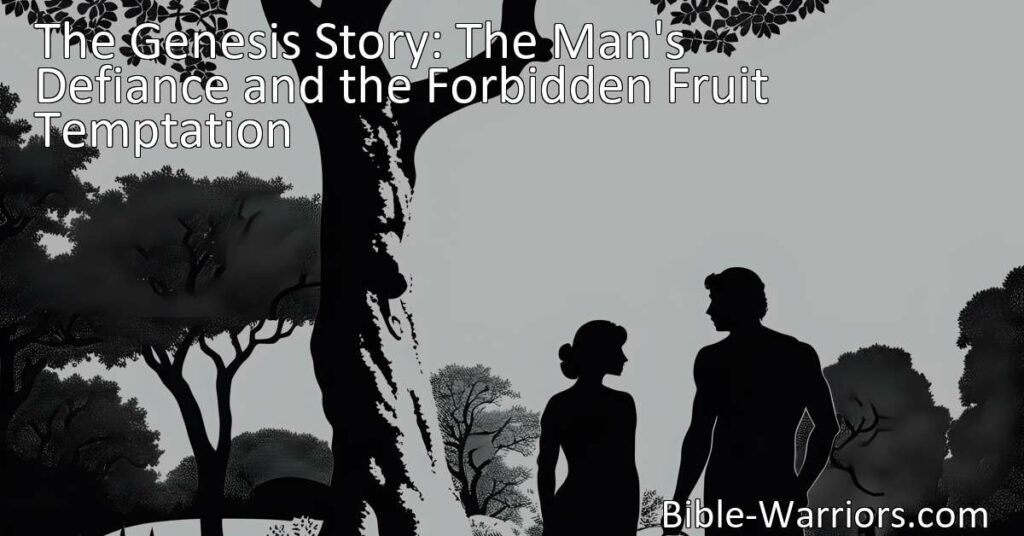Genesis 3:12 – The man said, “The woman whom you gave to be with me, she gave me of the tree, and I ate.”
In the Genesis story, Adam and Eve face the temptation of the forbidden fruit. This episode teaches us about the power of temptation and our tendency to defy authority. The struggle against temptation and defiance are still relevant today, reminding us to take responsibility for our actions and resist the allure of forbidden pleasures.
Table of Contents
Introduction:
In the book of Genesis, a captivating story unfolds, showcasing the journey of humanity and the eternal battle between good and evil. One particularly intriguing episode is the story of Adam and Eve, their encounter with the forbidden fruit tree, and the consequences that followed. This story serves as a lesson for humanity, highlighting the power of temptation and our inclination towards defiance. Join us as we dive into this ancient narrative, exploring the man’s defiance and the forbidden fruit temptation.
Understanding the Verse:
In Genesis 3:12, we encounter an iconic response from Adam, the first man, when questioned by God regarding his consumption of the forbidden fruit. With a tone that oozed defiance, Adam seemingly deflects blame onto the woman God had given him, saying, “The woman whom you gave to be with me, she gave me of the tree, and I ate.” This response marks a pivotal moment, unveiling not only Adam’s attempt to avoid responsibility but also his inherent human flaw – the inclination to blame others for our own mistakes.
The Forbidden Fruit Temptation:
To comprehend Adam’s response fully, we must rewind a bit to the very beginning. God had created a breathtaking garden, Eden, as a paradise for humanity to dwell in. Within this enchanting garden stood the infamous Tree of Knowledge of Good and Evil. God bestowed upon Adam and Eve the freedom to enjoy everything in the garden except for one thing the fruit from the forbidden tree. This prohibition was a test of their obedience, ensuring they could exercise self-control and respect the divine command.
Enter the serpent, the embodiment of temptation and deceit. The serpent, cunningly persuasive, engaged Eve in a conversation about the forbidden fruit. With compelling words, it enticed her, saying that they would not die if they consumed the fruit but, instead, become like gods, possessing knowledge of good and evil. The serpent presented a tantalizing possibility, and Eve succumbed to the allure. She plucked the fruit and ate it, then gave it to Adam, who willingly took a bite.
The Man’s Defiance:
Once they ate the forbidden fruit, Adam and Eve’s eyes were opened, and they realized their newfound vulnerability and guilt. In the aftermath, they hid from God, consumed by shame and fear. When confronted by God, Adam’s response reveals a profound act of defiance. Not only does he blame Eve for his actions, but he also indirectly blames God by saying, “The woman whom you gave to be with me.” In this moment, Adam showcases a refusal to own up to his own choices and seeks to shift the blame onto others. His words denote an attempt to justify his actions rather than accepting responsibility for his defiance of God’s command.
The Human Temptation and Defiance Today:
While the events of Adam and Eve’s defiance occurred in the distant past, the struggle against temptation and defiance is still prevalent in our lives today. We may not live within the walls of Eden, but we encounter situations daily that test our integrity and resilience. The forbidden fruit symbolizes the allure of forbidden pleasures, the temptation to deviate from what we know to be right. Just as Adam struggled with this temptation, we, too, grapple with our desires, often giving in to impulses that contradict our values and beliefs.
Moreover, Adam’s response to God’s inquiry mirrors our tendency to deflect blame when caught in the act of wrongdoing. We often find excuses to avoid taking responsibility for our actions, just as Adam blamed Eve and even God himself. This inclination towards defiance instead of acceptance can hinder personal growth and damage relationships, preventing us from rectifying our mistakes and developing into better individuals.
Conclusion:
The Genesis story of Adam, Eve, and the forbidden fruit teaches us valuable lessons about temptation and defiance. Adam’s response exemplifies the human inclination to shift blame and avoid taking responsibility for our actions, mirroring the struggles we face today. By understanding this timeless narrative, we can better recognize the allure of temptation and the importance of accountability in our own lives. Let us remember that true growth comes from acknowledging our mistakes and choosing to learn from them, rather than succumbing to the allure of defiance and shifting blame. Through self-reflection and conscious decision-making, we can strive to recreate Eden within ourselves.
Freely Shareable Bible Verse Image Genesis 3:12
I hope this Bible verse image brings you hope and peace. Share it with someone who needs it today!



